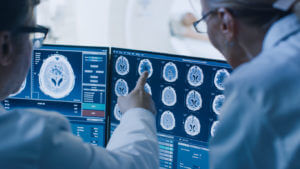A neurologist is a medical professional specially trained to diagnose and treat conditions affecting the brain and nervous system. These conditions can range from mild headaches to severe neurological disorders that can result in paralysis or death. If you or someone you know is experiencing symptoms that suggest a neurological problem, seeing a neurologist as
Read MoreNeurologist Howell MI
Advancements in Neuroimaging: High-Resolution MRI and Beyond
Neuroimaging is the process of producing images of the brain with the use of imaging techniques. Advancements in neuroimaging allow doctors to study the brain and its function and play a crucial role in identifying abnormalities associated with neurological conditions. Brain injuries, spinal cord tumors, strokes, and aneurysms are all evaluated with the help of
Read MoreA Comprehensive Guide to Cerebral Palsy Treatment
Cerebral palsy (CP) is a group of disorders that affects a person’s ability to move and maintain balance due to brain damage that occurs during fetal development or infancy. It is the most common childhood disability affecting the motor system. While there is no cure for cerebral palsy, treatments and therapies exist and are aimed
Read MoreSigns of MS You Shouldn’t Ignore
Multiple sclerosis (MS) is a chronic, often disabling disease that impacts the central nervous system (CNS), which consists of the brain, spinal cord, and optic nerves. Symptoms may be mild or severe and periodic or continuous. The cause of multiple sclerosis is largely unknown, however, it’s thought to involve damage to myelin, which is the
Read MoreBrain Exercises to Try for Improving Memory
Frequent brain exercise could be your key to keeping your memory sharp as you age. Research shows that challenging mental activities stimulate the growth of new brain cells (neurogenesis) and preserve the existing ones, thereby effectively protecting a person’s brain health and thinking power from decline. So, if you are looking for ways to give
Read MoreSeizures That Can Affect Children
Seizures can affect your child’s life in many ways. They can also cause discomfort, fear, and worry for you as a parent. Seizures can’t always be prevented, but there are things parents can do to help manage the condition as effectively as possible. THE DIFFERENT TYPES OF SEIZURES Generalized Seizures: The widespread electrical discharges of
Read MoreIs there treatment available to help curb dizziness?
Lightheadedness, feeling woozy and unbalanced, a sensation of movement of yourself or everything around you – there are many ways to describe dizziness. Experiencing it can be more disconcerting than just a temporary loss of your bearings if it is accompanied by nausea, vomiting, or the sense that you are about to faint. Dizziness is
Read MoreHow Do You Treat a Stress Headache?
Do you suffer from headaches brought about by stress? Most people describe stress headaches as feeling like a tight band around their heads. The causes of stress headaches vary and are affected by many different factors, not all of which are completely understood. After all, everyone deals with some sort of stress, but not everyone
Read MoreDifferent Symptoms of Seizures
A seizure is a telltale sign of a neurological condition. It can affect a person’s behavior, movement, or consciousness for a few seconds to minutes. While a seizure can happen after a stroke, head injury, or infection, it can occur without warning, too. Read on to learn more about what seizures are and their symptoms
Read MoreTreatment Options For Hemifacial Spasms
Hemifacial spasms are a condition marked by the involuntary twitching of facial muscles. The word “hemifacial” means that this condition affects one side of the face. In some cases, these twitches leave patients unable to control their facial expressions. Hemifacial spasms may come and go, or they can occur constantly. There are several causes behind
Read More










